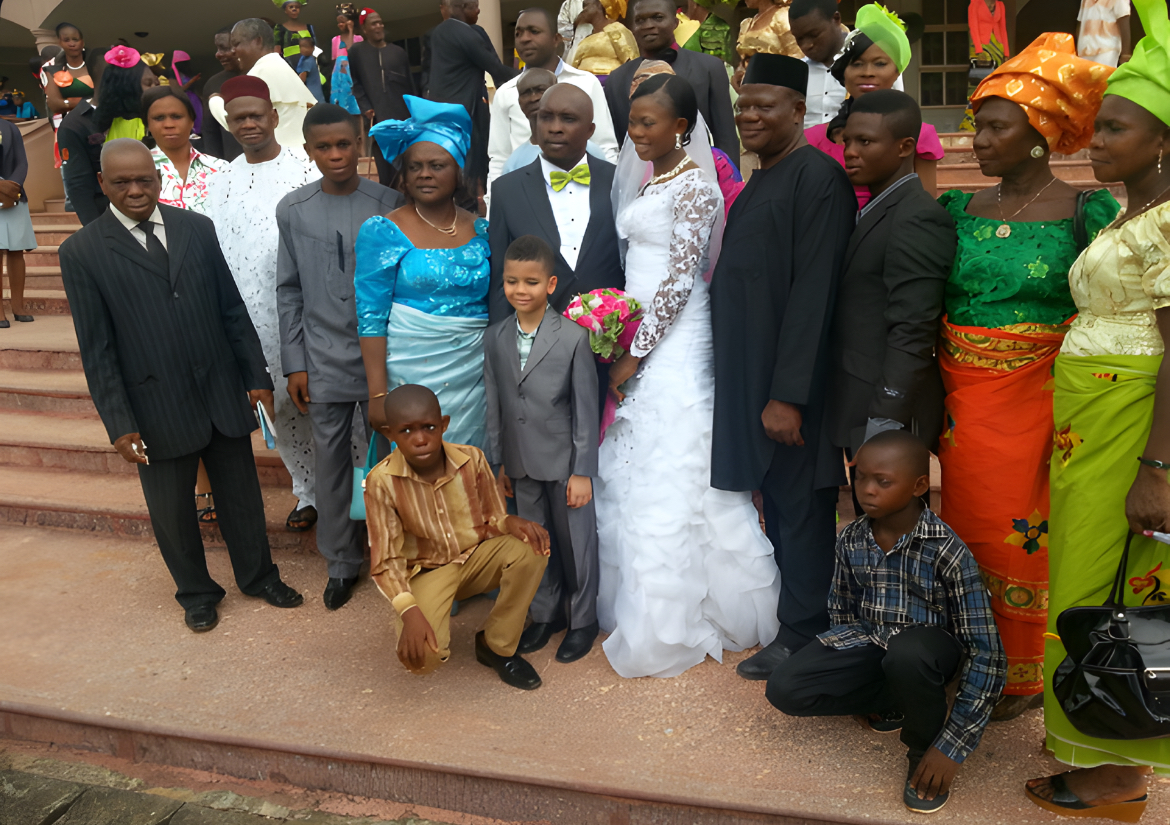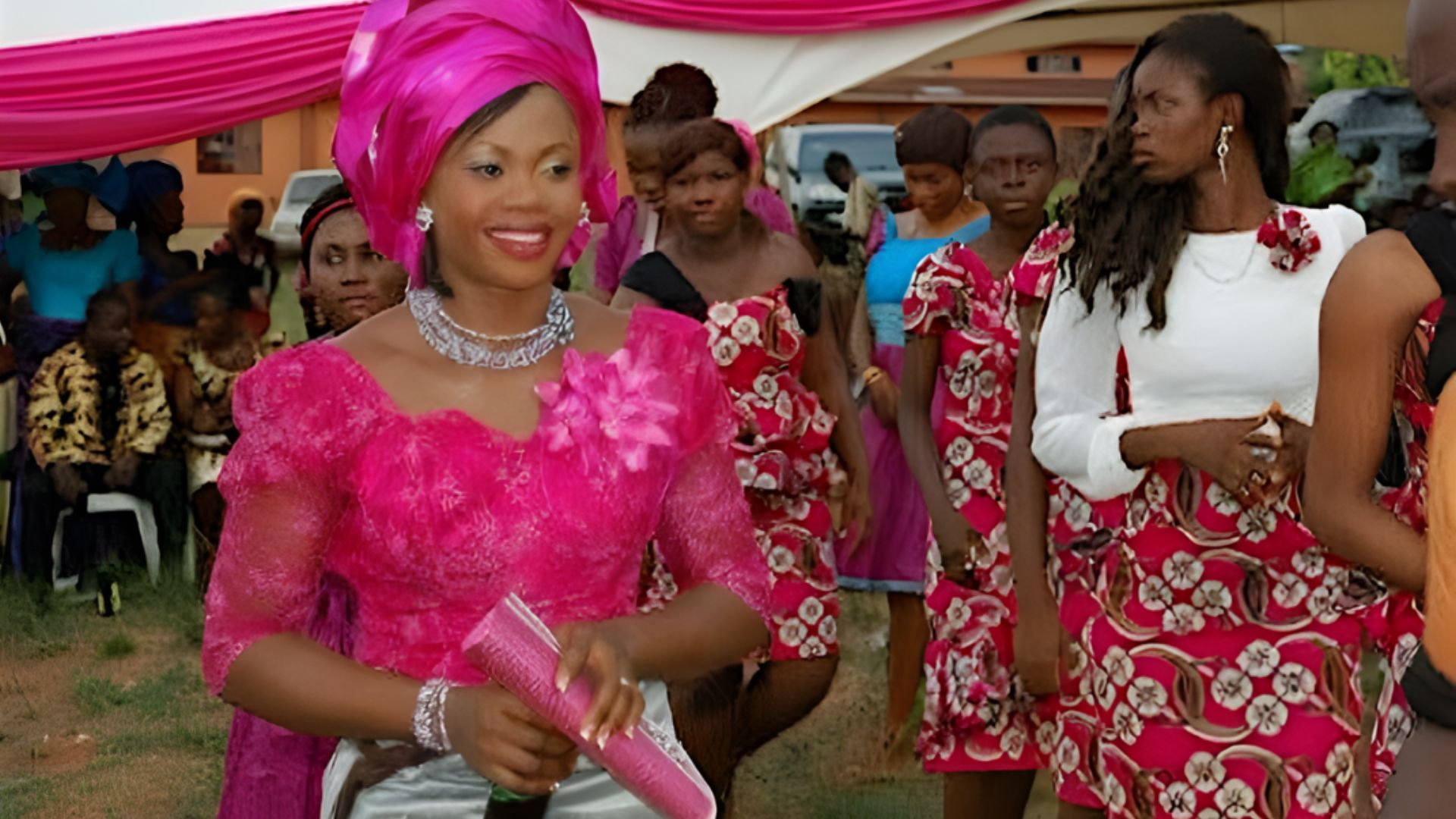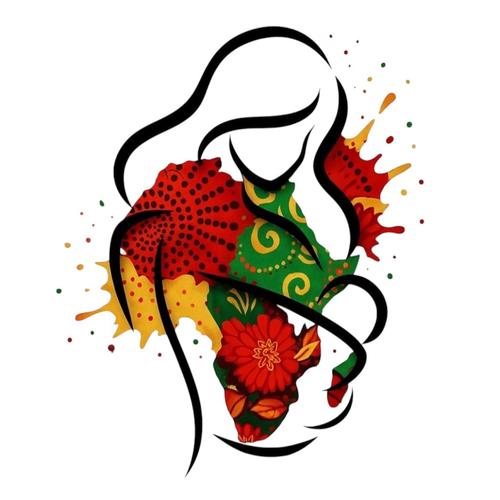Dancing Through 3 Weddings 💍
(A Culture Shock Scented with Jollof Rice and Sparkling with Colors)
When I was invited to my first wedding in Nigeria, I had absolutely no idea what awaited me. It was my first time in Nigeria, I was there with our three-year-old son, I had just turned 24, and my idea of a wedding was simple: a ceremony, a nice dress, a reception, a few speeches.
But in Nigeria, a wedding is anything but a formal event. It's a celebration that feels more like a festival. People dance. They eat—a lot. And above all, everyone, truly everyone, wears something beautiful.
The bride often wears more than one outfit—sometimes even three different looks—for the traditional ceremony, the church wedding, and the evening reception. The families of both bride and groom have their own color schemes. Women from their circle of friends and relatives often arrive in dresses made from the same fabric—this tradition is called Aso Ebi.
When I first saw it, I was in shock. Not because of the abundance of colors or sparkle, but because of the harmony. Every person became part of a bigger picture. And the women wore their dresses with such pride, they could have walked straight onto a fashion runway.
Back in 2009, there were no smartphones, so I have very few photos from that visit. But I'll share a few snapshots from later weddings I attended—especially around Christmas, when there are many celebrations thanks to the perfect dry season weather with no rain.
Traditional and Church Weddings – Two Celebrations in One Day
In many cases, weddings in Nigeria involve two ceremonies: one traditional (usually held at the bride's family home) and one church wedding. The traditional one is deeply rooted in the culture and customs of the ethnic group—in our case, the Igbo tradition, which included a kola nut ceremony, the symbolic handing over of the bride, and blessings from the elders.
The second part, the church wedding, is more modern. The bride wears a white dress, just like we do. There's singing, dancing, clapping—no long, solemn rituals. Here, God is celebrated with joy, not in whispers.

When Clothes Speak: Aso Ebi, Gele, and Men's Elegance
One of the most beautiful things at a Nigerian wedding is watching how the women dress. Aso Ebi, the coordinated group attire, is not only visually stunning but deeply communal. It says: I belong to the bride, I support her, I'm here with her.
Each woman has her outfit tailored to her taste, but from the same fabric. Some choose lace, others prefer a slim fit, while another might opt for dramatic sleeves. What unites them are the colors and the shared respect for the moment.
Then there's the gele – a bold and elaborate headwrap. Learning to tie it is a story of its own. And although I struggled with it at first (sometimes literally wrestling with the fabric), I quickly understood it was more than a fashion accessory. It's a crown. And women wear it with regal grace.
Men typically wear outfits that reflect their status – traditional tunics, kaftans, and embroidered caps. They often coordinate with their wives, and when a couple arrives together, it's like the entrance of a royal delegation. In color, elegance, and presence.
My Role? A Visitor from Another Culture – Welcomed as One of Their Own
The hardest part wasn't understanding the rituals, but relaxing, allowing myself to be part of it. Stopping myself from looking through the eyes of an outsider, and instead, looking with my heart.
Nigeria changed me in that way. Here, I learned that beauty doesn't have a single form. That clothes are not just decoration, but a language. And that even though I was white, different, and came from far away, I could still belong – if I came with respect and openness.

Why Every Woman Should Experience This
At Nigerian weddings, one thing always moves me: how radiant and proud every single woman looks. Regardless of age, size, or status. It's as if the day doesn't just belong to the bride – but to all the women who are part of her celebration.
African fashion has the power to give women something we often lose in Europe: a sense of beauty without conditions. And so, I didn't just leave with a memory of a love celebration, but also with a new way of seeing myself.
Cooking for Hundreds: Love Served on a Plate
Another huge surprise for me was how perfectly organized the food preparation is – even when the wedding hosts 200 or 300 guests. In Nigeria, food is part of showing respect. It's not enough to simply have "enough." It must be delicious, hot, and served so that everyone gets some – even those who arrive late.
The preparations involve women from the family, village cooks, and sometimes professional caterers, if the family can afford it. Celebrations are often held in a courtyard, a rented tent, or under the open sky – while in another corner, massive pots of rice are cooking, meat is simmering, sauces are being prepared, and plantains are frying.
The most common options are rice dishes (such as jollof rice, fried rice, or white rice with chicken) or "swallow," which is a starchy side dish like eba, semo, or fufu, served with thick soup and meat (such as egusi, ogbono, or ofe nkwu).
The food service runs like a military operation – at the start of the wedding, you'll often see young men and women in gloves delivering plates to specific tables or groups. And even with dozens or hundreds of guests, no one is left hungry. That would be a deep shame for the family.
At my first wedding, I was served jollof rice, chicken, and fried plantain. I sat in the heat under an open tent, the hum of music in the background, gele shimmering around me – and felt as if this country was embracing me with its food.
Traditional Igbo Wedding – A Ritual of Uniting Two Families
A civil ceremony at the registry office isn't deeply celebrated in Nigeria – it's usually just a formality to legalize the marriage. The real events are the church wedding and, before it, the traditional wedding in Igbo culture. This is deeply rooted in history and family. It's more than just a formal ceremony – it's the blessing and uniting of two families.
The entire ritual usually takes place at the bride's family home. It begins with the welcoming of the groom's family – they bring gifts, food, drinks, and, most importantly, kola nuts, which hold deep symbolic meaning in Igbo culture. Without kola nuts, no serious discussion takes place.
Then comes something like a negotiation – traditionally symbolic. The bride's family must "accept" the groom. This is followed by the elders' blessings and a truly beautiful moment: the bride enters the gathering carrying a cup or bottle of wine, searching for her groom. She dances towards him, kneels, and offers him the drink, thereby "choosing" him – a moment that sets the whole wedding into applause and joyful cheers.
After that, the families exchange gifts and officially unite. The bride and groom change into traditional outfits specific to their region.
At that moment, you know this is not just a wedding – it's a ritual handed down from generation to generation.
